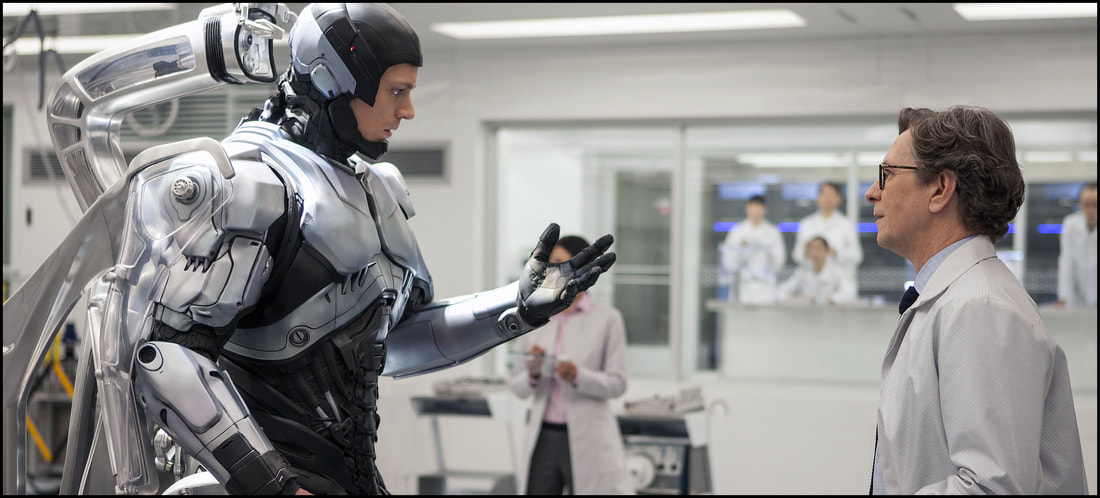Why?
Well, I just knew it had the kind of big-budget goodness that was best preserved in my memory by viewing it with a crowd. Big laughs always mean more when shared with an audience. Exciting, frenetic, mind-blowing action sequences usually draw collective astonishment from the onlookers. And who doesn’t love applauding the hero when others are present and actively listening? Now that I’m a bit older (if not a bit more jaded or cynical), I tend to take a week or two before watching such theatrical releases. These days, I do try to get to a showing that’s fairly light on people. It isn’t as if I’m anti-social; I’d just rather not risk any undue influence in order to serve up what I feel is a much more honest and more clinical valuation of the film, definitely one not inspired by what the yucksters sitting next to me thought.
Sigh.
I guess I’m gettin’ old, fans. But if I can age as nicely as the RoboCop franchise can, then I’m in good company.
(NOTE: The following review will contain minor spoilers necessary solely for the discussion of plot and/or characters. If you’re the type of reader who prefers a review entirely spoiler-free, then I’d encourage you to skip down to the last two paragraphs for my final assessment. If, however, you’re accepting of a few modest hints at ‘things to come,’ then read on …)
From the film’s publicity materials:
“In the city of Detroit circa 2028 (seriously? Detroit is still around after its financial collapse?), police detective Alex Murphy (played with conviction by Joel Kinnaman) uncovers a criminal conspiracy that looks to implicate some high-ranking officers on his squad. At the same time, the multinational, war-mongering conglomerate OmniCorp is seeking the right candidate to put inside one of their latest creations – an urban combat suit – in order to expand their domestic sales and corner the market on profits. When those in Detroit decide Murphy needs to go, billionaire businessman Raymond Sellars (a greedy Michael Keaton) seizes the opportunity to put a part-man, part-robot police officer on the streets. But what happens when the former cop turned machine decides to investigate his own attempted murder?”
Where the original RoboCop (1987) was smart, smart, and smart, this new version is dumb, dumb, and – mostly -- dumb.
It comes compliments of director Jose Padilha, relatively still fresh from acclaim rightful earned from his 2010’s Elite Squad 2: The Enemy Within (which, incidentally, is a vastly better film than this is). 1987’s RoboCop script – penned by Edward Neumeier and Michael Miner – was crafted almost with a winking acknowledgement to the audience: don’t take any of this any more seriously as you need to, and you’re likely to have a helluva lotta fun with it. The violence was gory and (I’ll admit it) gloriously gratuitous because that kind of visual flair lent itself nicely to their intended aesthetic of the picture. Structurally, it had similarities to the great American Western – a lone gunman seeks to clean up a corrupt town – though there were some obvious swipes at capitalism, the ultimate ‘bad guy’ in anything churned out by Hollyweird in the past half century.
While still being vastly superior to the RoboCop sequels that followed in the footsteps of the original, this 2014 reboot suffers largely from the singular distinction of being completely unnecessary.
It echoes back most of the major talking points of the original film – OmniCorp’s suits are still villainous, though with vastly bloated emphasis on corporate villainy, while Murphy’s family (Abbie Cornish as Clara Murphy, along with young John Paul Ruttan as son David) get real screen time in order to ground the film in what serviced as a stronger ‘humanity’ for audiences. However, gone is that constantly winking eye; in its place is some forced histrionics dished out by everyone’s favorite foul-mouthed screamer Samuel L. Jackson as some futuristic Fox News wannabe talking head who rarely makes logical arguments. (He does get a great laugh, though, by casting the U.S. Senate as “pro-crime.”) I’m guessing filmmakers thought they were aping longtime Fox correspondent Bill O’Reilly, but Jackson comes off more like watered down and occasionally cocaine-fueled Stephen Colbert of Comedy Central fame.
Also, the first RoboCop distinguished itself with clever moments of newsroom satire, peppering the screen with visually exciting news stories and interviews that helped lampoon the crime-ridden world of tomorrow. Unfortunately, scripter Joshua Zetumer’s story never quite figured out how to contemporize that aspect; instead, the screenwriter begins throwing things at the proverbial narrative wall, desperately hoping something might strike the same chord with audiences. At one point, he even crafts a narrator describing the action taking place on the screen (a device that goes on for far too long and desperately needed a better sound mix than the one provided if producers wanted it to be understood); instead of complementing the film, it ends up creating probably one of the most alarming ‘WTF?’ moments in recent film memory.
The new RoboCop isn’t a total failure. Rather, I see it as a reboot missing more than a few upgrades.
Mildly recommended.
Like most critics, I suspect the overwhelming question – “Was RoboCop really in need of such a flavorless reboot?” – truly kept me from enjoying this version as a legitimate SciFi offering when director Jose Padilha served up only a competent, CGI-laden action film, one largely intended for our video-game-friendly culture. Performances work only so far as they’re needed for a video game (doting wife, loyal partner, crooked cop, corporate sleaze, etc.), and the real weakness here was a terminally flawed script that could’ve quite figure out what it wanted to be when it grew up.
-- EZ


 RSS Feed
RSS Feed